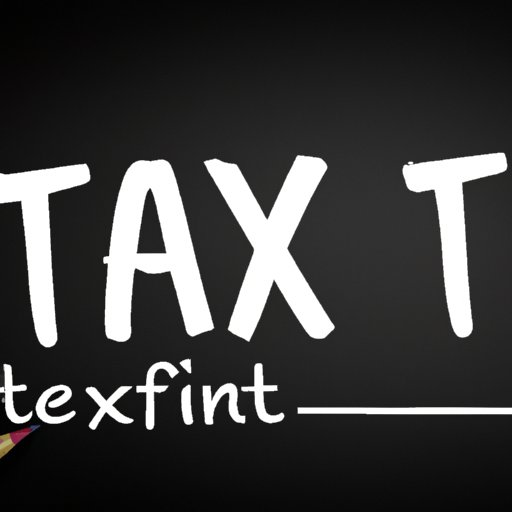Introduction
For many businesses and entrepreneurs, taxes can be a confusing and complicated process. One term that is often used in the context of taxes is “writing it off.” But what does this phrase mean and how can it help you save money when filing taxes? In this article, we will explore the concept of writing it off and how it applies to tax deductions and business expenses.
Exploring Tax Deductions: What Does Writing It Off Mean?
To understand what writing it off means, it is important to first understand the concept of tax deductions. A tax deduction is an amount of money that you can subtract from your taxable income when you file your taxes. This can reduce your overall tax liability and result in a larger tax refund or smaller tax bill. There are a variety of deductions available to individuals and businesses, but not all expenses are eligible for deductions.
When it comes to business expenses, there are certain items that are eligible for deductions. For example, any costs associated with running your business, such as office supplies, equipment, travel expenses, advertising, rent, and utilities, may be deductible. Additionally, certain types of business insurance premiums may also be deductible.
Writing it off simply means taking advantage of these deductions and reducing your taxable income. When you write off a business expense, it reduces the amount of money you owe in taxes. For example, if you have a total taxable income of $50,000 and you have $5,000 in eligible business expenses, you can write off those expenses and only pay taxes on the remaining $45,000.
A Guide to Understanding Business Expenses: What Does Writing It Off Mean?
When it comes to understanding business expenses and writing them off, it is important to know what expenses are eligible for deductions. Generally speaking, any expense that is ordinary and necessary for the operation of your business is considered deductible. This includes things like office supplies, advertising, travel expenses, rent, and utilities.
It is also important to keep accurate records of all of your business expenses. This is essential for tax preparation and ensuring that you are taking advantage of all of the deductions available to you. Be sure to save receipts, invoices, and other documents related to your business expenses so that you can easily reference them when filing your taxes.
Another important tip is to avoid common mistakes when deducting business expenses. For example, do not try to write off personal expenses as business expenses. Additionally, make sure that you are not claiming expenses more than once and that you are accurately reporting all of your income.
Using the Tax Code to Your Advantage: What Does Writing It Off Mean?
In order to take full advantage of writing it off, it is important to stay up-to-date on the current tax laws and regulations. Researching the most recent changes to the tax code can help you identify potential deductions that you may not have been aware of before. Additionally, you should look into any applicable tax credits that you may qualify for.
You should also consider utilizing tax strategies to your advantage. This can include timing your tax return to receive the largest refund possible or spreading out your income over multiple years to reduce your tax liability. Planning ahead and researching the tax code can help you maximize your tax refunds and minimize your tax bills.
Maximizing Your Tax Refund: What Does Writing It Off Mean?
Once you have identified your eligible business expenses and taken advantage of all of the deductions and credits available to you, it is time to prepare your tax return. Utilizing tax preparation software can be helpful in making sure that your tax forms are accurate and complete. Additionally, be sure to double-check all of your forms before submitting them to the IRS.
Timing your tax return is also important. Depending on when you file, you could potentially receive a larger tax refund or owe less in taxes. If you are expecting a refund, filing as soon as possible will ensure that you get your money back quickly. On the other hand, if you owe taxes, you may want to wait until closer to the deadline to file, as this can give you more time to save up and pay your taxes.
Making the Most of Your Finances: What Does Writing It Off Mean?
In addition to taking advantage of tax deductions and credits, it is important to manage your finances in order to maximize your savings and minimize your debt. Budgeting and tracking your spending can help you stay on top of your finances and ensure that you are making the most of your money.
Investing in the right financial products can also help you grow your wealth over time. Consider consulting with a financial advisor to determine which investments are best suited for your goals and risk tolerance. Finally, managing your debt is key to achieving financial stability. Paying off high-interest debt, such as credit cards, can help you save money in the long run.
Conclusion
Understanding the concept of writing it off can help you save money when filing taxes. By taking advantage of deductions and credits, you can reduce your taxable income and maximize your tax refund. Additionally, staying informed about current tax laws and utilizing tax strategies can help you further reduce your tax liability. Finally, budgeting, investing, and managing your debt can help you make the most of your finances.
(Note: Is this article not meeting your expectations? Do you have knowledge or insights to share? Unlock new opportunities and expand your reach by joining our authors team. Click Registration to join us and share your expertise with our readers.)
